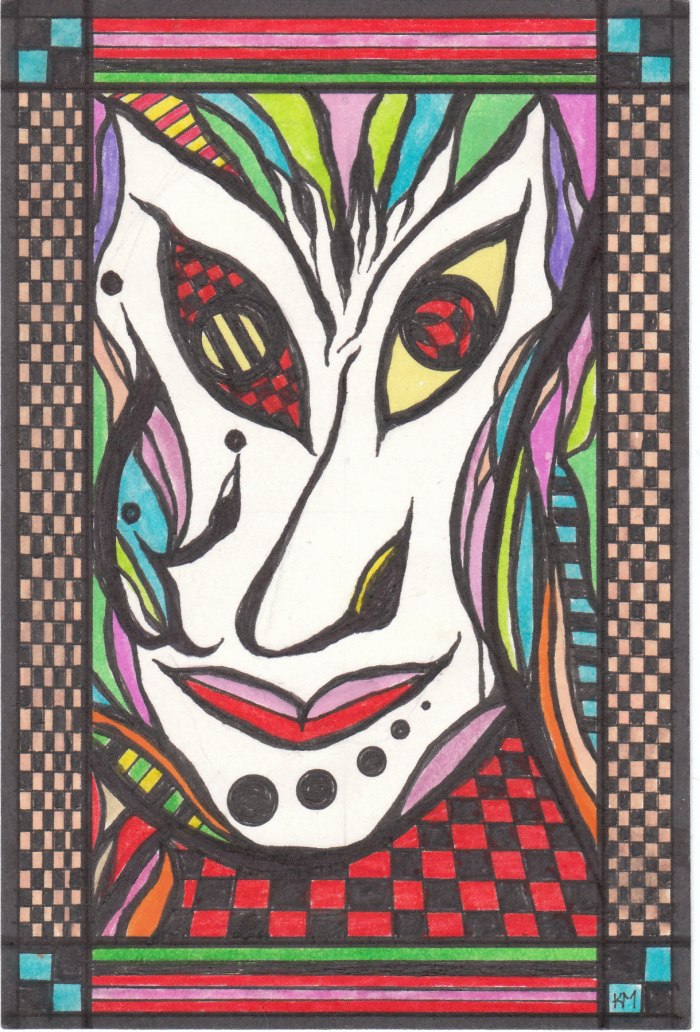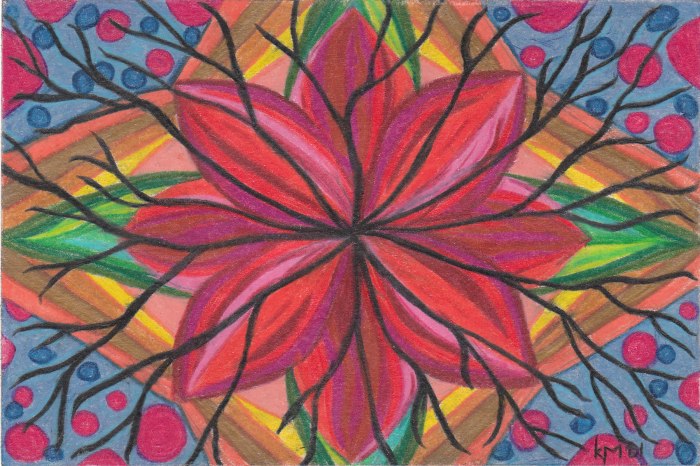Though the medical treatment for psychiatric illnesses has improved enormously in recent years, there’s still significant social stigma related to mental illness—a stigma that will lessen only as we invite those diagnosed with chronic psychiatric disorders to share their stories and talk about their struggles.
In this spirit of raising awareness and initiating dialog, I’ve invited readers of my blog to ask questions about my 20 year struggle with bipolar disorder, and last week I was asked if the now nearly normal me, the medicated me, feels less authentic than the crazy but creative version I experienced when I was most symptomatic.
So, does the recovering Kathy miss the mania? Do I miss the crazy, creative energy that allowed me to paint and draw, write and research, think in new and creative ways?
These are obviously difficult issue, but the short answer is yes. I do feel less like myself and less alive than I did when I was manic. I feel less authentic, less like the me that I like best.
When I was ill, creating felt effortless, as automatic as breathing, and I did it with the urgency and abandon of falling in love, deeply and maddeningly in love. I could no more not create than I could not now eat or sleep or dream of waking up tomorrow in a world with less poverty, less hunger, better housing in places like Haiti and more rights for women, children, gays and lesbians, the mentally ill and anyone living near the edge, far from the center of the bell curve that is middle America and suburban comfort.
Now creativity takes effort. It’s labor-intensive and even exhausting. Now it requires industry and diligence, determination, duty, drive.
But it’s better than it was when in the early ‘90s I began taking antipsychotic medication and the only ones around were things like Haldol and Navane, the older generation of drugs that made me feel even less like myself than I do now. Those drugs made me feel lethargic, zombied, and at times even, down-right dead. On May 8, 1990 I described it like this in my journal:
No one understands what enormous effort it takes for me to do anything—brush my teeth—wash my hair. No one understands . . . how afraid I am, how my life has been reduced—how I feel like a failure.
I don’t know what to do with myself—I mean, I don’t want to do anything—nothing sounds appealing—not even reading and writing. I mean, the frustrating thing is that I feel like I have no emotions or desires or urges—everything feels flat, blunted. I don’t feel creative or bright. I feel boring and stupid, to be honest. Everything just takes so much effort. I want to do something with ease. I want to be successful. I’m tired of being sick. Sick is scary. And I think that scared is what I feel the most—scared about the future—scared about my ability to live life—scared about the essentials—everything that matters.
The drugs made me feel thick-headed—like I had to swim through a fog to interact with the world. I had to fight to stay awake—to keep my eyes open—to carry on a conversation—to process language. Friendship was nearly impossible—too much work—too much to have to talk—articulate, move my mouth to form the words. The drugs blunted everything human about me—made me lose everything and anything I loved about myself, a woman with passion, a woman who cared intensely about the world and the people around her.
All of this was gone—or at least out of reach—beyond the fog I couldn’t fight or navigate my way through. The fog was dense, thick, terrible and deep.
But the newer drugs of the 21st-century are better. The medicated me of this decade is more alive and energized than the me of 10 or 20 years ago. I no longer fight the fog that separates me from the world. Now I only fight an internal fog that keeps me from the deepest and most creative places inside, keeps me from the bursting, blooming, art-making place in the center of my psyche. Now writing, painting, drawing mean managing this mist, hacking through the haze between me and the vibrant, secret center where the creative but crazy Kathy waits.
But she’s still there, there’s still that space, where the two-faced me, magnificent monster, gorgeous and god-awful, hideous and holy, hides.
(Special thanks to Dana at Zona Pellucida, Renee at Life in the Boomer Lane, Mrs. H. at A. Hab’s View of the World, and Jane at PlaneJaner’s Journey for quesions related to today’s post).





















You are an amazing woman!
LikeLike
Thank you, Lisa! You’re pretty awsome yourself, my friend!
LikeLike
hello this is very good i suffered from it myself so understand about it keep up the good work.
LikeLike
Thanks so much for reading and taking the time to comment! I’m sorry to hear you struggle with this, as well. It’s tough, isn’t it! I hope you’ll stop by again!
LikeLike
Enthralled by what you write and what you have to share that helps us gain a fuller understanding…many thanks!
LikeLike
Gosh, Charles, you are so welcome. Can’t tell you how glad I am this is helpful!
LikeLike
And me, too! I asked about issues of authenticity as well! 🙂 (PICK ME, PICK ME!!)
This is an amazingly profound post, Kathy. I’m particularly blown away by your earlier struggle with an “external” fog because of the older-generation drugs compared to your struggle with the “internal” fog now. The thought of such a bright bloom of creativity resting just outside your grasp is haunting…
Brilliant as usual, my friend!
LikeLike
Oh, Dana, I’m so sorry to have missed you! Shit–I’ll mention you next time. I got so many comments and so many subtle variations of this one. I’m sorry, my friend!
LikeLike
Gosh, Dana, gonna respond again to the real content of your comment this time and say thanks for your interest in this internal/external fog thing–what I hate the most now is how hard I have to work to get to the creativity–it’s sometimes agonizingly difficult–I struggle for each word, image, thought–reach, strain, attach, retract–whiplashed back to the less creative, more mundane me. It is haunting. It’s crazy–maddening.
Thanks so much for noticing this——————
LikeLike
Thanks for this response. My brother was diagnosed as bipolar several years back, but still pretty far into adulthood. He had been alternately the meanest and most fun-loving kid when we were growing up, but at the time, my parents didn’t know it was something that required help beyond a good spanking or suspension of priveleges. His diagnosis shed a whole new light on our childhood experiences.
LikeLike
I’m sorry to hear about your brother, Patti. Researchers are beginning to look more and more at bipolar disorder in kids. My mother said I was the moodiest kid imaginable–insanely happy or desperately crying, so I suspect my illness was present in childhood, as well.
It’s good that the diagnosis is helping you make sense of the past, but I’m sorry to hear your brother is sick. It’s got to be sad for you and an enormous struggle for him.
Thanks for reading. I hope you will stop by again!
LikeLike
I’m glad that treatment methods have improved over the last few years, Kathy…I hope that further research can refine them even more!
Hugs,
Wendy
LikeLike
Actually, I attribute my improved mental health condition to advances in psychopharmacology, and in that area, I suspect, things can only get better. So things are looking up! Thanks, Wendy————————-
LikeLike
Thank you for sharing this, Kathy. I could have written those two paragraphs from your 1990 journal. When I’m going through a bad patch (like now) and have had to take more medication, that’s exactly what I experience. Some days it takes every ounce of energy I have to just take a shower in the morning, let alone accomplishing anything else.
LikeLike
Lisa, I am SOOOOOOOO sorry to hear that this is the nature of your struggle. That lethargy is truly debilitating. I understand! Even now if Sara asks me when she comes home from work what I did on a given day, I wil include bathing on the list. I still consider that an accomplishment to be proud of. Sara says a shower is a given and most folks wouldn’t brag about it. But, most people can’t even imagine this kind of struggle. I’m sorry, Lisa–truly. I understand. Hugs to you, my friend!
LikeLike
Forgot to mention this in my last comment (!): I also understand the “brain fog” you speak of. Although I’ve never been creative in an artistic sense like you, I used to have a brain which worked pretty well. Now I have memory problems and also often feel really stupid, because things I used to do so easily before, are just too much for me to cope with. I’m just telling you this so that you know there are others who understand exactly how you struggle to function “normally”.
LikeLike
I sorry this is your experience, but to find someone who understands this is truly amazing! Thanks for letting me know–helps to feel less alone!!!!!!!!!!!!!!!!!! And, yes, that feeling of stupidity is painful–really, really painful. I have to work so hard to do things that used to come with relative ease!
LikeLike
This is such a great post and the fact that you took the time to acknowledge people is so YOU. What a gift you are. And I’m honored to be one of those who you acknowledged.
LikeLike
Ah, Renee–how could I not acknowledge you! You are dear and your comments/quesions/observations are priceless–really! Thanks more than anything for encouraging me to move ahead with this memoir project—————–
LikeLike
I missed this entry a couple of days ago! Mea culpa, mea culpa, mea maxima culpa! Thank you so much for the shout-out. 🙂 I really appreciate the nod.
I also appreciate your diligent and honest response to our questions. These are some meaty subjects you’re getting at, and I can absolutely feel the emotions (or the lack of emotions when you felt none) that you describe in this post. Your paintings are haunting…in the most amazing way. They will stick with me, and I am made better for it.
LikeLike
Thanks so much, Amanda! I’m pleased these posts are speaking to you, and I VERY MUCH appreciate your comments and questions! You make me think. You make me a better writer. You rock, my friend!
LikeLike